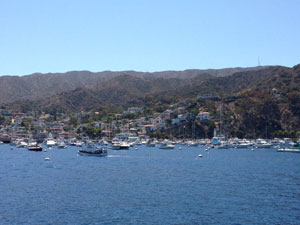Island Mice Project
Welcome
This website was created and is maintained by six doctoral students in an interdisciplinary program at

Many islands including Catalina Island shown here have heavy boat traffic. Photo: By Elizabeth Pitts
North Carolina State University. We are supported by funding from the National Science Foundation’s Integrative Graduate Education and Research Traineeship (IGERT) program and affiliated with North Carolina State University’s Genetic Engineering and Society Center. Ours is the only IGERT program in the nation to bring together the natural sciences, social sciences, and humanities. These different perspectives facilitate collaboration and training for students to better understand the construction, implications, and impacts transgenic organisms (a plant or animal containing genetic material artificially transferred from another species) may pose on ecosystems and societies.
Our group is open to the potential benefits that genetic engineering methods may offer to the field of conservation biology. However we are aware not only of the use and impacts transgenic mice may have on wild house mouse populations, but also the impacts they could have on entire ecosystems as well as human society. Together we explore the ecological, social, and ethical implications of releasing transgenic rodents as a form of pest management, and assess the appropriateness of such methods. Our home programs are Biomathematics, Communication, Rhetoric, & Digital Media, Fisheries Wildlife & Conservation Biology, and Zoology. Academically and professionally, we bring a variety of perspectives to the intersection of biotechnology and conservation biology. We do not share a unified view and cannot account for every possible perspective. Some of us hope to see this technology develop and be implemented while others are more cautious about the ethical problems genetic techniques may pose for human society. We have come together to investigate, learn, and discuss these complex issues. This website is a result of our collaborations.